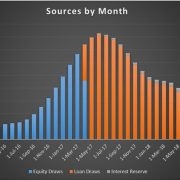Transitioning From Employee to Commercial Real Estate Entrepreneur with Kyle Keene | S3SP14
In this newest special episode of the A.CRE Audio Series, Sam and Michael talk with Kyle Keene from Keene Development Group about his transition from an employee in the industry to a commercial real estate entrepreneur. Kyle transitioned from working for a construction management group into starting his own development group.
Listen to this episode to learn about Kyle’s story and to gain some important considerations on how to bridge the gap and transition from employee to entrepreneur.
Going from Real Estate Employee to Entrepreneur
Or Listen to this Episode
Resources from this Episode
- A.CRE Real Estate Financial Modeling Career Accelerator
- A.CRE Development Models
- Education in Real Estate
Episode Transcript
Announcer (00:01):
Welcome to the Adventures and CRE audio series. Join Michael Velasco and Spencer Burton as they pull back the curtain on everything commercial real estate and introduce you to some of the top minds in the industry. If you want to take your skills to the next level and be part of a growing community of CRE professionals across the world, this is for you.
Sam Carlson (00:26):
Hello and welcome back to the Adventures and CRE podcast. We got a good one for you today. This one kind of hits close to home only because I think it was season three, was it season three when we did deal making and deal doing? Michael was that season three?
Michael Belasco (00:39):
Yes. It was I believe.
Sam Carlson (00:41):
Yeah, what I really liked about season three was we really got into the nitty gritty. We got our fingers into transactions and we got to really explore them. And that was a lot of fun for me personally because I don’t necessarily do the transactional side of things, but whenever I see somebody that is transitioning from maybe a corporate side or I think Michael, you were saying before, we were talking a cog in the will function to transitioning away from that and doing this thing themselves, I always think there’s a ton of inspiration, there’s a ton of information to take from those people. So today we are joined by Kyle Keene with Keene Development Group and he’s got a cool story. We’re going to learn a lot from him. And so I’m excited. Michael, why don’t you go ahead and just do a quick little intro and we’ll jump into the conversation.
Michael Belasco (01:33):
Yeah, thanks Sam, as you said, and I am as well I’m really excited to have Kyle on. Kyle’s one of those great stories of why a lot of people get into real estate. You get in early on, there’s so much to learn and you try to get involved with companies where you can learn a ton and sometimes you end up getting caught in the mix, even if your ambitions are to go out on your own and you might end up staying there forever and maybe it’s because the opportunities are great or maybe it’s just you kind of got stuck in a position and Kyle’s story is one of which he had a great experience, spent a lot of time, learned as much, and had this difficult moment where he was trying to transition and figured it out and was able to break away, move back to his hometown in Greenville, South Carolina and really just take on a lot of really exciting and awesome projects.
(02:31):
I don’t want to give away too much. I’d love to have Kyle dive in and tell us his whole story and it’s really great. And I think the message here is for all of our listeners is how can you bridge the gap, if you want to be an entrepreneur, how do you make this transition? And Kyle I think has one of probably many blueprints out there, but it’s a really fascinating story. So Kyle, why don’t we kick it over to you? How about you give an introduction of who you are, what you’re up to currently, and then we can take it back to where it all started and give people insights into how you transitioned to where you are.
Kyle Keene (03:08):
Absolutely, and thanks for having me on. So my name’s Kyle Keene, and so I started Keene Development Group and we are out of Greenville, South Carolina. I’m a Greenville, South Carolina native, and got a bulk of my experience to this point in New York City on the construction end, worked for a construction manager or a developer GC first and then into a construction management group. And so I got to learn a lot about the hard costs of the project on the development side, which is my first boss who I always looked at as a mentor, he wanted me to start in on that end if I was up for it because that’s the most expensive part. That’s where things really can go wrong or they can go how they’re supposed to go. So I dove in and learned as much as I could, ended up liking the industry a lot and staying in the industry, but I always had that goal to eventually bridge into development on my own.
(04:27):
And so I was always seeking those what happens on the other side, the acquisition side, the underwriting side, all of that. And I guess you could call it, I don’t know my destiny or fate, however, you want to describe it, but ended up coming back down to Greenville, South Carolina after about nine years in New York to make a visit and ended up staying there and making that my permanent move shortly after we got out of the pandemic. And I thought it was a good time to, while I was in Greenville visiting, I took the Accelerator and to me, that was a good way to bridge the gap. And one thing led to another and I was finding investors, pitching deals and I finally landed one.
Michael Belasco (05:25):
Just to back up, I’d like to delve more into this transition. So you were primarily on really just the construction management side, correct, back when you were in New York.
Kyle Keene (05:37):
Right.
Michael Belasco (05:39):
And that’s really where the rubber meets the road. You can underwrite, you can value deals, and then that’s really where the business plan, I like to say, and this even goes for asset management, if you’re not in development and you’re managing just a stabilized deal or value add deal, the rubber meets the road on the management side and it’s really critical to understand the nuts and bolts of that. And so you spent 10 years diving into those details and managing all of that so to get to your transition, what types of roadblocks were you facing, or how come it took you until this moment? Were there things that you felt you needed to learn that were gaps or was it just that you didn’t have the space or time to go out and find deals? What was it that prevented the transition?
Kyle Keene (06:24):
I would say it was a bit of both, but more, I went up to New York because during grad school I said if I want to do this, I want to do real estate development, that was always my interest, but I want to go learn one piece of it if I need to, but I want to go learn. And what I saw at the time, the toughest place to learn the most red tape, the most challenges and to me that was New York City. And so when I got into construction that was so new to me, I was a business major and then was getting my MBA. So it’s no real-world experience and definitely, no real estate development or construction management taught in that path. So really it took me three to four years before I even really got comfortable with the construction management side. And yeah, I was calling and harassing the developer who ended up first working for about two years and he said, if you come up here I’ll have you work on our GC side, you need to learn the hard cost side.
(07:37):
If you’re up for it, move up here and we’ll hire you. So that’s what I did. I had no clue what I was getting into and so it really took, again, it took some time to really just get comfortable in that space. So I was looking at stuff and kind of trying to value it myself, but I didn’t really know what I was after really. So I really wanted to make sure I had a base, a strong base in one aspect of the development process. I think that’s really what can bridge the gap is knowing one thing well and then moving on or bringing the other end along with it to make your first move.
Sam Carlson (08:20):
It’s interesting because I think there’s definitely something to that, right? If you’re a person that is wanting to do your own business someday, the first question is, okay, well who do I need to be able to do that next thing? It doesn’t make sense and a lot of people will jump to what’s the best opportunity, yadda, yadda, yadda. Well, that’s putting the cart before the horse. So taking the time to exactly earn your stripes, learn how it works is a smart thing. I think people take that path in different ways. Here’s my next question. So you know you want to do this, you put in the work, you put the time to do it, coming up with an investment thesis or basically, hey, what am I going to do?
(09:06):
What is the move? Because I know even you come hang out in circles when Michael, Spencer, and I are together in person and we’re just talking about business and the ideas and things just kind of fly and then all of a sudden over time they kind of consolidate down to an idea. So I’m very curious about your idea, what your process was in picking your chosen niche. So we can talk about your chosen niche as well obviously, but what was that process of saying, hey, here I am getting the skills, now it’s time to start doing some deals. You see what I did there, the rhyme, you guys pretty good. So what was that process like, and then where did you end up?
Kyle Keene (09:48):
So that’s a great question. So coming from New York, all I worked on, I had a very small piece of it was working on a conversion project, but primarily I was always on a job that was high-end condo or high-end multi-family rental. And so when I ended up making a decision, okay, I’m going to move back to my hometown and I’m going to make this move and do this, I mean the intention was to bring down to Greenville, South Carolina, what I was working on in New York because I didn’t see anything like that. You have your custom homes and you have that quality here, but it’s just one single-family home. A builder built it, they bought a lot, built it, or an owner built it and they hired someone to build it for them. There was nothing of a true development that had the same quality and I just knew it would be well received.
(11:03):
And especially with what Greenville’s seeing so many people move down from New York, so many people come from California, Chicago and they can actually move down here and they’re going to want that product, they’re going to want that type of residence when they come down here and they may not want to wait to buy a lot and then have a builder build it. So I knew I was creating something that really wasn’t down here yet. We have plenty of townhomes, but I’m able to actually use some of the contacts in New York that I have to really introduce that to this market.
Sam Carlson (11:37):
So were you thinking about, hey, your target demographic in New York and you also know that they’re migrating south for the winter to those types of locations?
Kyle Keene (11:49):
That was the goal, that was the intent.
Sam Carlson (11:51):
It’s funny because they say that history doesn’t repeat itself, but it rhymes. That same concept when you’re looking at business models where they’re proven in one area can be maybe not duplicated but replicated, you know what I mean? And so taking a winning idea, applying that to, hey, we’ve already got a flow of people who have bought here, they’re going to go down here, and why wouldn’t they want to see the same product that they love here that they saw back in New York? So that was one of your… Okay, well that’s awesome man. Yeah, go ahead Michael.
Michael Belasco (12:32):
So you moved down to Greenville, it’s not a new market for you, but with the lens that you’re wearing as getting into real estate development, I mean I assume it’s somewhat of a new market in that regard. So you’re coming into a new market, you’re just leaving a job and I’m not sure I’d love to learn more, are you sourcing capital? How do you start? Are you sourcing capital? Are you trying to get fee development deals? How do you get going when you’re just getting your first deal?
Kyle Keene (13:08):
Oh, man. Well, you got to be ready to go through about a thousand opportunities that you think you have, maybe you might have an investor or you might have a motivated seller. So the first step you got to be ready for a lot of disappointments. So I was absolutely chasing deals down and whether it was just land that I thought had been just missed by another developer here, whether it was a building that could be converted, torn down and new development in that area, but it was basically just calling owners of existing properties and I knew I had to get that step, I had to get a motivated seller and then I would do all the underwriting on my own and then I would just bring it to a few people that I had relationships with that I knew could fund the deal and I would work in a fee and that’s how I would do it.
(14:22):
I had the construction management knowledge, I’m at a point where I’m very confident in my underwriting and now I just was missing the piece to fund these things. So absolutely I was pitching myself and what I was bringing to investors as a fee developer and that’s really how I started and got to the next one. So yeah, I mean really after, I mean major disappointments, I mean under contract with so many and it fallen through, et cetera, we finally landed one and that’s exactly how we structured it. So this is a development opportunity where I am the fee developer and I’ve actually for this one done a large syndication, which was a hurdle was because of a hurdle where we had to end up, I had to go through the SEC, do all the filing. So yeah, I’m doing a syndication on this and I have one strong majority investor, the rest is through that group and I worked in a fee based on milestones.
Sam Carlson (15:36):
I think this is important and especially looking back, any entrepreneur when they look back, they tend to, and you didn’t do this, but they tend to gloss over all of the work that had to go into the actual deal work. I’m not talking about coming up with the ideas and all the work you put in the 10 years in New York to learn things, but when you go out and actually start doing the business, all of that excitement of creating what your offer to the market’s going to be, all of that is now put to test by your ability to execute and I think that is where people in any business, and especially from your experience, I’m guessing you would agree with this, the daily execution, the bird-dogging of new deals, the opportunities, the, hey, run this up the flagpole, take it back down, run this up the flagpole, take it back down.
(16:29):
That is something that if you think you’re going to come out and be a sniper and the deals are going to come to you, you shouldn’t do it, you shouldn’t do it because that is all of the pain that you have to go through. Maybe down the road you’ve established contacts, referral sources, things along those lines that will pay dividends in the long run but upfront you are putting in, you could call it sweat equity, you were putting in so much ground time and consistency that I think some people are not cut out for. So I want to ask you, I want you to go back to running deals up the flagpole, daily grind, waking up because I guarantee you, and you can correct me if I’m wrong, if I’m wrong, then you’re superman, the self-doubt when you wake up, the did I make a mistake when you wake up?
(17:22):
Talk me through that real quick because, and not to dwell on the past or go into the paint, but that’s a reality in business that people gloss over and they just focus on the shiny object at the end. So go back to whenever that was and talk me through that.
Kyle Keene (17:39):
Yeah, yeah. So it’s like you can have just so much progress and you’re getting really excited that my hard work it’s paying off, this thing’s going to happen and then a week later, I mean that deal is out the door, it doesn’t make sense anymore going through due diligence, you found this out or the other and it just falls apart completely or you had a very strong commitment from an investor and their expectations were different. So they’re going in a different route now. So you lose that, you have to start all over again and multiple mornings waking up disappointed, self-doubt, absolutely. And then that’s where you really got to make a decision am I going to just give up now and go back to the daily just working for under a developer or are we going to stay persistent and consistent on this and just keep driving and driving on some of those hopefuls?
Michael Belasco (18:56):
And let me ask you this-
Sam Carlson (18:57):
Can I interject real quick, Michael, I want to piggyback on this. When you were going through all these deals, the ones where terms weren’t what you thought you were finding out stuff, okay, so that was the first time you were going through, sorry Michael, but I really was thinking, I’m like, okay, you go through that the first time, did you learn things by approaching those issues and looking back and saying, oh, I could have potentially renegotiated the terms or I could have potentially structured the deal differently or I could have potentially approached the deal in a different way so when I know that those things are coming back, I can then negotiate from a point of power, a position of power rather. When you’re going through those deals, did you look back and say, oh, whenever I approach a deal now I’m going to do X, Y, Z. Because I’m guessing some of those deals could have turned into deals had you approached them differently. Did you take anything away from that process?
Kyle Keene (20:01):
Absolutely. And I continue to, even though right now we’re getting out of design development with this deal that we’ve executed on. So even now still I have a notebook and it’s huge and it’s just like what are we going to do different. I mean, I’ll look back at every phase of this one deal that you could consider was a successful execution and I’m critiquing that, so the next opportunity this is going to be more efficient and just run a lot smoother. But going through the process of finding that deal, getting to this point, absolutely. I mean it was what did we do wrong there? Why did this fall apart? And I think if you take a step back, kind of step out of your disappointment, look at it with that lens, it makes things a lot easier and more motivating to move forward on finding the next one, going after the next one and that’s exactly what I did. I mean I wrote notes and it’s kind of formed and still forming, I guess you could call it my business values or business strategy for my company.
Sam Carlson (21:16):
Michael, it reminds me when we were going through season three and we were talking about negotiating, I can’t remember what episode that was, but we were talking about negotiation and Spencer was talking about being the type of person that always leaves like you’re always a good partner, so you’re leaving meat on the bone for the other person and approaching a transaction from the get-go of, hey, we don’t know necessarily what heads are going to rear themselves, but we are going to approach this so everyone wins. So as you’re saying that, I’m just remembering back to that episode in particular, so anyway what were you going to say?
Michael Belasco (21:53):
There’s a challenge there when you’re starting off and Kyle, I’ve been there and as I continue to grow, there’s two things, there’s time and there’s time management, especially when you have nothing there yet, you’re pursuing a deal, you’re just starting out, you only have so much time in the day, you’re not getting paid for that as you’re out there pursuing that and then you have to decide on whether to keep going or not and then there’s the capital piece. Not only is it your own money that you’re spending, for me it’s either you’re flying across country to check out a deal or you’re meeting with people, you’re paying for consultants upfront, so it’s your own capital. But then there’s the risk of somebody else’s capital where if you convince them on a development deal, there’s a deal I’m working on right now where we’re pursuing entitlements and there’s this pursuit capital, and when you are establishing new capital relationships and you’re out there spending money, there’s this deal.
(22:52):
Not only are you leaving meat on the bone for the other person, it’s almost like you have your reput reputation to preserve. And so you almost have this feeling of I might just come out of pocket for this in order to preserve the long run reputation. So it’s almost like this anxiety and challenge, but through that, and I want to go back to the timepiece is that sometimes time is your friend and reacting too quickly when you’re thinking about there’s a problem, the best thing to do if you find a deal is something it wasn’t and I’ve experienced the same thing, Kyle, you go down the road, you’ve spent money assuming something was something else, and maybe the seller represented something and it turned out to not be, which has happened to me.
(23:39):
And then you think the deal’s dead, right? And you got to go talk to the capital partner, this is what happened. Sometimes you just sit and you take time, maybe you don’t act on it for a day. It’s almost like that saying where if you’re angry and you write an email, never hit send. You always wait until the next day. It’s the same thing when you’re managing all these different points. It’s like if there’s this intense moment, never act and never react and just wait and sometimes you just sleep on it or you go out for a walk or you go work out or you go hang out with your kids, whatever it is, and all of a sudden things start moving. It’s like, wait a minute, there is actually, so for everybody that’s new or starting out where it’s like nothing’s ever concrete, there’s always this gray area where maybe it’s not exactly what you thought, there’s actually a workable deal here, creative, just give it some time.
(24:28):
And I’m talking about time and capital in all different types of ways, but those are the two buckets that I sort of think of and it’s like your own capital, other people’s capital, managing your reputation with capital, managing the expectations with capital and then using time where yes, you have certain deadlines and all that, but the making sure that you manage that time wisely when it comes to interacting and reacting. And so I’m sure you’re experiencing that now Kyle. And as you start to develop the reputation more, it gets easier and easier. But when you just get out there, that’s just some of the tricks and sort of things I’ve figured out just tranquilo, wait for a minute.
Kyle Keene (25:07):
Exactly. And reputation, I’m glad you said that because that’s the biggest thing to me and I guess for anyone starting out right now, because if that goes out the window, your first deal or while you’re working on your first deal, it’s a lot tougher to recover from, in my opinion, on the next one or at least with those investors. So that was such an important aspect of this deal. I mean, I assembled, it’s six parcels and so we were dealing with four separate sellers and it was just tough managing or at least trying to work with all these personalities that they had different reasoning behind why they were selling or what their goals were within this deal. So I had one, the majority investor in this deal, he was very patient, he’s in the retail side of things, but no development experience or before this interest in getting into that.
(26:16):
So he understood the process of a transaction. So I think that was fortunate in this first one. And I think if anybody’s out there wanting to go this path, go out on their own, seek that if you can, someone who has at least done some kind of real estate transaction, whether it be the retail office, a development project, but if possible, I think that’s just so important to have someone right there, whether they’re actively involved or not, that you understand so you can manage the expectations a little easier.
Sam Carlson (27:02):
Yeah, that’s good. We’re coming up here on time and I’m curious if you’re… And I think where we’re going here and you have some nimble, the cool thing about where you’re at in your business is you can be incredibly nimble. There’s opportunities with infill and these different value adds in local markets that a lot of these institutional investors are not going to be participating in. They’re going to be standing on the sidelines and I think that there’s a lot of that coming. But I want to ask you maybe more of a subjective question.
(27:37):
If you were to look back and look back at where you were before you jumped in with both feet, you acquired some experience, you acquired some knowledge, you took the Accelerator, which would bridge the gap in terms of some of the soft skills that you need to see whether or not deals were worth doing or not, what are some of the maybe invisible or unspoken of skills that you said, I wish I would’ve focused more on this, negotiation skills, communication skills. What are some of those things that you think maybe would’ve paid? Had I come in with that mindset I feel like I would have done it faster, not better maybe, but faster?
Kyle Keene (28:25):
I mean, communication would’ve been a big one for me because I think, like you said, Michael, I came into not a new market, but I had just spent a significant amount of time in a totally different market than Greenville, South Carolina. Communication’s totally different and that’s wherever you go in these markets we have in this country. So I think if I would’ve initially approached my pursuit, just more of softer in times as in really trying to communicate what my intentions were initially and things don’t move as fast as they do where I came from on a transaction side, they want to know what your plans are, they want to be comfortable with who’s buying their property, but just having the mindset of knowing, okay, I’m in a totally different market. People do business differently in different places. So that was probably the largest thing if I’m looking back now, can really say that I wish I would’ve approached it initially differently. And just having that mindset would’ve helped a lot.
Michael Belasco (29:49):
I love that. What you’re basically saying is take time to understand the customs and the culture of a different market to what you’re going.
Kyle Keene (29:57):
Exactly.
Michael Belasco (30:01):
And I’m in the northeast, I’m right outside of Philadelphia, and where some of the places I look at and am investing in are not this high-intensity northeast energy. And I’ve learned that over time. And so when I go approach these other opportunities now I actually find the local groups. If I’m looking at a development dealer for example, I need to get something entitled, I actually approach these local consultants. I’ll look to the planning department records, I’ll see who’s coming up nonstop, who are the engineers or who are the consultants that you constantly see in the minutes and put myself back a little bit and let those guys potentially take the lead. But I love that you brought that up because you come in and I’ve done that. It’s like you come in and you’re so excited and you’re like, why can’t you guys just get on? Let’s get going here. No, I’m not like that. And so you really need patience people skills again, it’s great. It’s really, really great. Final thought, that’s awesome.
Kyle Keene (30:58):
Appreciate that.
Sam Carlson (30:59):
Just in terms of closing things out here, Kyle, I’m sure we’ve got people who listen to this podcast will listen from students to directors, all sorts of people are listening to this, if people want to connect with you, what’s the best way to do that?
Kyle Keene (31:14):
I would say the best way to do that is LinkedIn and yeah, Keene Development Group has an Instagram as well.
Sam Carlson (31:23):
Okay. Awesome man. Well, thanks for being on here. We do appreciate it. It’s inspiring. I think a lot of people at some point in their career do aspire to taking that step out into the dark, I guess you said you could say. And so to see other people do it is inspiring and it’s been awesome talking to you. And for anybody listening, watching, whatever, thanks for coming and giving us your time, and we will see you on the next episode.
Announcer (31:53):
Thanks for tuning into this episode of the Adventures and CRE audio series. For show notes and additional resources, head over to www.adventuresandcre.com/audioseries.








